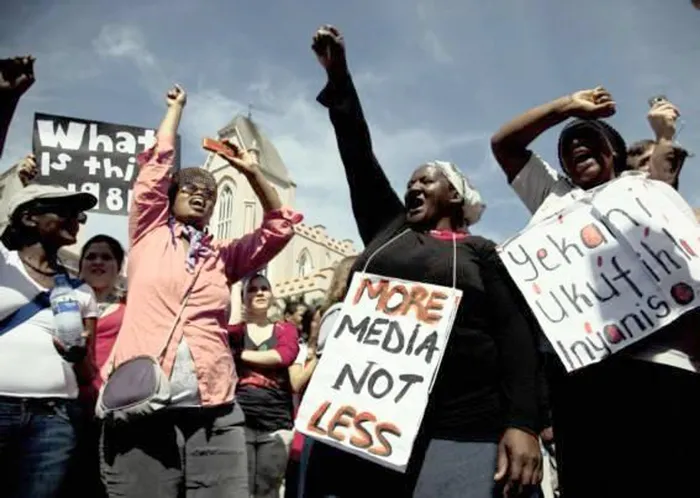National Press Freedom Day: Media freedom and peace

In the context of an unequal world where liberty is at risk, the role of the media is crucial, writes Brian Williams. Picture: Reuters
by Brian Williams
Media freedom is measured on the basis of how words are used to promote or suppress ideas. Before violence and killings start, negative ideas and words are usually mobilised as weapons for war.
The arena for war or peace lies in the way words are assembled and communicated.
Create fear, suffocate them and then drench them with untruths, is a standard propaganda strategy used to control human behaviour for destructive purposes.
History has shown that it is possible to poison people’s minds so they see other human beings and nature as disposable. The first step is the weaponisation of words through labelling and demonising. Character assassination is typically used to dehumanise and to create a climate of hostility.
Spin doctors within public institutions have emerged with greater force as assassins to target those who speak truth to power, and to manipulate facts. Physical assassination during apartheid has been replaced with a greater emphasis on character assassination in a post-apartheid period.
Media freedom exists within the broader concept of universal human freedom which each person automatically has. Freedom of speech does not include hate speech and lies. Freedom in a society has peace at its centre. Peace, within a broad context is usually defined as a state of balance or tranquillity or harmony.
As humans we strive for different states of harmony within the multiple identities that co-exist within us. In the context of an increasingly unequal world where freedom is at risk, the role of the media is crucial.
There are always competing rights and it is in this context that the nature of freedom in a society is ultimately decided by its Constitution as the supreme law. Whoever controls the decision-making power in a country can determine the framework of freedom in relation to a range of rights.
The ruling elite frames freedom within the law in a way that does not threaten its grip on power. From the time that words and symbols could be used as media to convey public thoughts, instructions were issued by political authorities.
In South Africa since 1652, first the Dutch and then, from 1795, a British occupation force imposed their ideologies to reflect the views of the bearers of economic and military power at the Cape. The European colonial mindset was reflected in the media to convey a master/slave understanding of human relationships.
The British Governor in 1800 established government controlled newspapers, such as the Cape Town Gazette and African Advertiser. Media control over time became dominated by English and Afrikaner capital. Media outlets require financing to exist and therefore must have a business model that invariably includes investors. This is where the intersecting antagonistic contradiction creates a messy media tension between the need to become economically sustainable and the necessity to hold abusers of power accountable.
In South Africa, the media owners, editors and journalists of the largely English-speaking media had to bear the brunt of an apartheid regime that did not want its oppressive deeds exposed. It reached a point where newspapers were banned, editors and journalists detained on October 19, 1977.
Democratic suppression takes different forms and the age of the spin doctor has arrived with full force in a post-apartheid period. Public institutions now tend to appoint former editors and journalists to prevent negative stories about their new masters.
Media freedom is inextricably linked to peace, democracy and the free flow of ideas. The visionary, independent and critically conscious role of an editor and journalists are the rocks on which public accountability is built. The editor and the courageous reporters are the ones who carry the social and economic burden to hold the line.
The personal and professional vision of the editor and team of journalists are the determinants in deciding the credibility of a newspaper. Cape Argus editor Aziz Hartley implemented a brilliant strategy to get influential voices in the community to reflect diverse views on key themes.
Editors must commit to ensure that they support those fighting to win back public institutions to serve the people. Through spin doctors, the power elite undermine democracy and are able to perpetuate false narratives. Media freedom and democracy is best served when statements coming from spin doctors employed by the institutionally powerful are even more critically examined.
South Africa, as one of the most unequal societies in the world, is going through a complex period in exposing corruption and oppression. Powerful economic adversaries are fighting one another within the ruling party. In contemporary societies, multimedia platforms must consistently promote the voices of the vulnerable and promote peace and justice. There is also a greater solidarity duty to use creative media sources to get alternative messages out. The media must be the fearless guardians of freedom, which is a necessary condition for the creation of peace.
* Professor Williams is visiting professor in fields of Peace, Mediation and Labour Relations. University of Sacred Heart, Uganda and Chief Executive: Williams Labour Law and Mediation. Thought Leader Award 2018: Issued Black Management Forum.
** The views expressed here are not necessarily those of Independent Media.
Cape Argus
Do you have something on your mind; or want to comment on the big stories of the day? We would love to hear from you. Please send your letters to [email protected].
All letters to be considered for publication, must contain full names, addresses and contact details (not for publication).